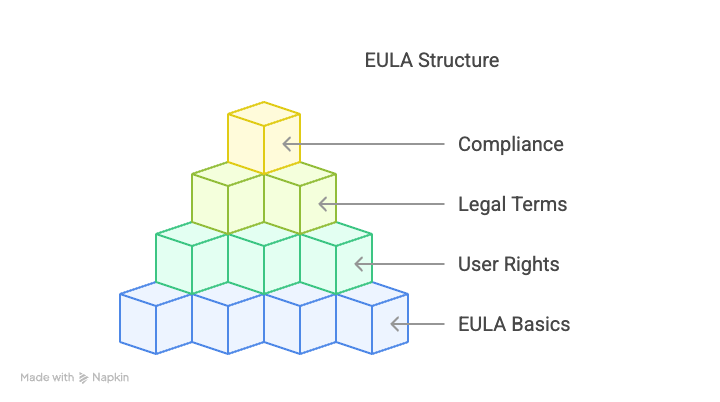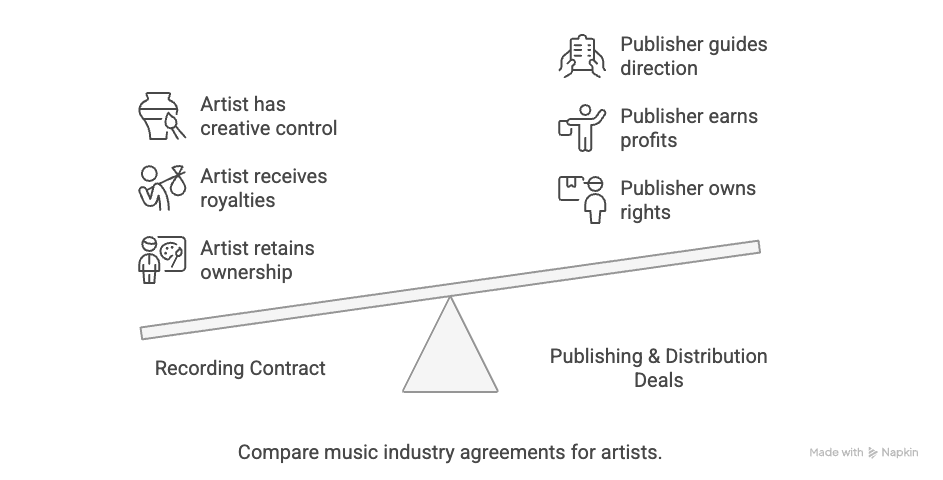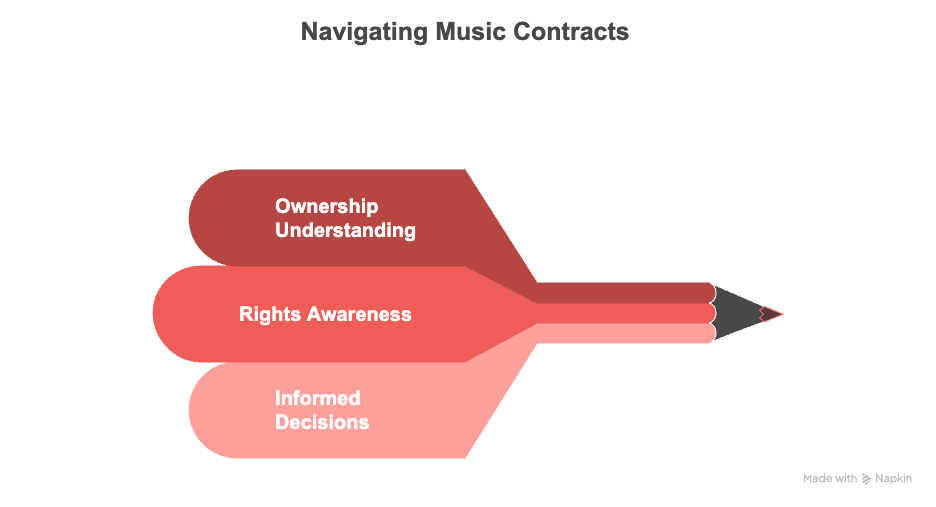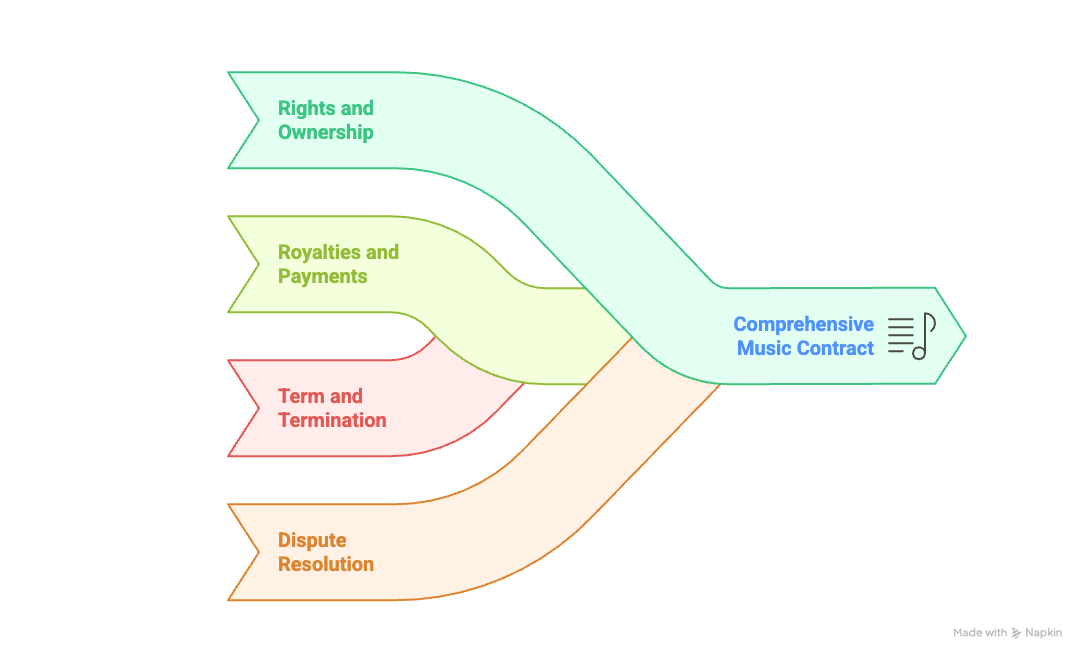
What Is An End User Licence Agreement (eula)? A 2025 Guide
Last Updated on May 10, 2025
An End User Licence Agreement (EULA) is one of the most important legal tools in the software industry — and yet it’s often misunderstood. Whether you’re a developer, SaaS provider, or digital entrepreneur, this guide breaks down what a EULA is, why it matters, and how to use it to protect your business and your intellectual property in Canada.
What Is a EULA?
A EULA is a legal agreement between a software developer (or licensor) and the person or entity that uses the software (the end user). It grants the end user a limited right to use the software under specific conditions, without transferring ownership. Unlike Terms of Service, which govern broader service use, EULAs focus specifically on software licensing.
What Makes a EULA Different From Terms of Service?
While both documents govern user behavior, a EULA is focused on the software product itself — how it’s used, distributed, copied, or modified. Terms of Service usually cover user interactions with an online platform or website, including content, user conduct, and privacy policies.
Key Difference: A EULA grants software usage rights; Terms of Service set conditions for using a platform or service.
Why Are EULAs Important for Canadian Software Providers?
Canada has strong privacy and IP protection laws. Without a EULA:
- You may lose control over how your software is used
- You expose your company to liability for user behavior
- You have weaker legal grounds for enforcement
A well-drafted EULA reduces legal risk, clarifies expectations, and helps enforce your licensing terms under Canadian law.
What Should Be Included in a Strong EULA?
A robust EULA includes:
- Licence Grant: What rights you’re giving (e.g., personal, non-transferable)
- Restrictions: No copying, resale, or reverse engineering
- IP Ownership: You retain all software rights
- Liability Limits: Protects you from user-generated risks
- Termination Clauses: When you can revoke access
- Governing Law: Preferably Canadian provincial law (e.g., Ontario, BC)
Is a EULA Legally Enforceable in Canada?
Yes, provided it’s:
- Written clearly in plain language
- Presented before or during installation
- Accepted via an "I Agree" button or checkbox (clickwrap)
Verbal or browsewrap agreements (passive terms with no user confirmation) are far harder to enforce.
Does a EULA Need to Be Tailored for SaaS, Mobile Apps, or Desktop Software?
Yes. Each distribution method requires slight differences:
- SaaS: Focus on uptime, access limits, and recurring billing
- Mobile Apps: Must meet Apple/Google app store requirements
- Desktop Software: May include device or user installation limits
How to Create a Legally Compliant EULA
- Start with a clear licence description
- Define user obligations and restrictions
- Include liability disclaimers
- Comply with PIPEDA and IP law
- Get user consent with an active checkbox
- Use plain language and avoid legalese
Download a Free EULA Template
Ready to create your own enforceable EULA? Download our free, Canadian-compliant EULA template in PDF format. Designed for startups, developers, SaaS providers, and app publishers.
Download the Free Computer Services Agreement Template
Ready to apply what you've learned? Get instant access to the Computer Services Agreement PDF - free, editable, and built for Canadian businesses. No sign-up required.
Frequently Asked Questions
Answers to common questions about What Is An End User Licence Agreement (eula)? A 2025 Guide.
Do I need a lawyer to use a EULA?
Not necessarily, but legal review is smart - especially for enterprise software or cross-border apps.
Can I reuse the same EULA for every product?
It’s better to tailor each EULA for the specific software, pricing model, and distribution method.
Is a EULA enough to protect my software?
It’s essential, but also consider adding Terms of Service, Privacy Policy, and technical protections (like license keys).
What happens if someone breaks my EULA?
You may be able to terminate access and pursue legal remedies under contract or IP law.
Can EULAs be used internationally?
Yes, but include jurisdiction-specific clauses and consider local consumer protection laws.
Is a EULA enforceable in Canadian small claims court?
Yes, especially if it includes clear terms and was accepted via clickwrap. Always retain a digital acceptance log.
Does a EULA need to mention refunds or chargebacks?
If your software includes paid licensing, it's wise to include your refund/chargeback policy in the EULA or link to one in your Terms.
Can I include my Privacy Policy in a EULA?
No. While both are legal documents, they serve different purposes. You should reference your Privacy Policy but host it separately.
What kind of language should I avoid in a EULA?
Avoid vague terms, excessive legal jargon, or any unenforceable claims. Stick to clear, user-readable language.
Can I reuse the same EULA for every product?
It’s better to tailor each EULA for the specific software, pricing model, and distribution method.
Is a EULA enough to protect my software?
It’s essential, but also consider adding Terms of Service, Privacy Policy, and technical protections (like license keys).
What happens if someone breaks my EULA?
You may be able to terminate access and pursue legal remedies under contract or IP law.
Explore More in Creative Digital Contracts
Discover curated templates in Creative Digital Contracts to help your business stay compliant and efficient.


